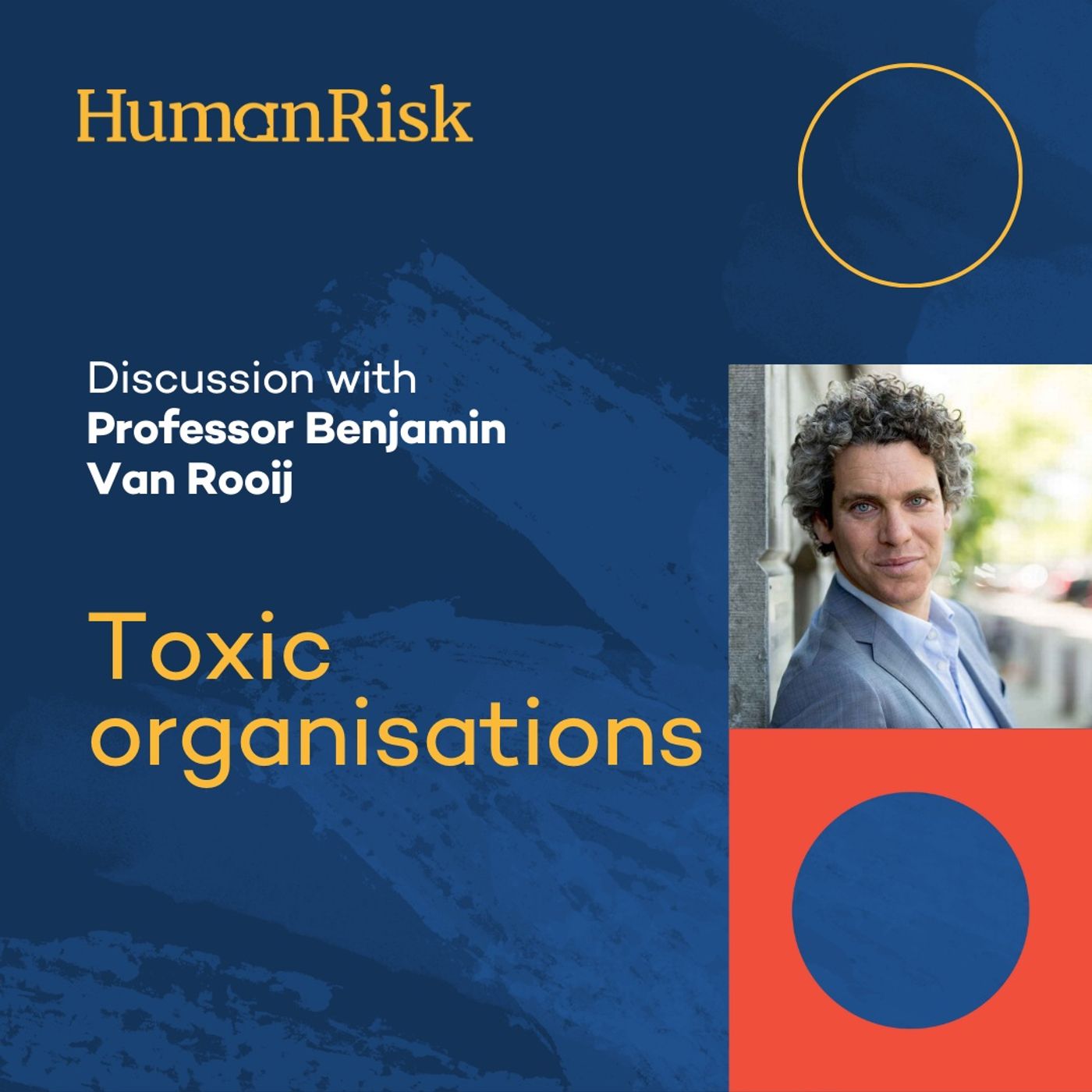March 29, 2025
Professor Benjamin Van Rooij on Toxic Organisations

What makes an organisation toxic, and how can we spot the signs before it’s too late? What are the common traits that make seemingly unrelated organisations, ranging from the Catholic Church to corporations, do harm?
On this episode, I’m joined once...
What makes an organisation toxic, and how can we spot the signs before it’s too late? What are the common traits that make seemingly unrelated organisations, ranging from the Catholic Church to corporations, do harm?
On this episode, I’m joined once again by one of my favourite guests — Professor Benjamin van Rooij — for a deep dive into the hidden dangers of organisational life.
Benjamin and his co-author, Professor Nicholas Lord, are working on a new book (working title) Toxic: Organisations Gone Bad, which explores not just headline-grabbing scandals, but the patterns of behaviour and structures that consistently lead organisations to cause harm.
Summary
In our discussion, we unpack how organisational processes — like silencing, secrecy, and the relentless pursuit of unrealistic goals — can multiply risk.
Benjamin explains why organisations, both public and private, can become “toxic” not simply due to bad people or poor oversight, but because of a combination of systemic dynamics and cultural norms that reward silence, over-ambition, and passive harm.
We also discuss why the term “toxic” itself is both useful and problematic, and how understanding these dynamics can help leaders make better decisions before disaster strikes; whether it’s Facebook’s role in spreading misinformation, Wells Fargo’s aggressive sales targets, or the normalization of deviance at Chernobyl and Enron, Benjamin helps us trace the common threads that connect seemingly unrelated crises.
And, true to form, he doesn’t offer simplistic solutions — instead, he gives us tools to ask better questions, challenge dominant narratives, and push for root-cause thinking over box-ticking fixes.
Guest Biography
Benjamin is Professor in Law and Society and Director of Research at the School of Law at the University of Amsterdam, as well as a Global Professor of Law at the University of California, Irvine.
In his academic work, Benjamin specialises in understanding how laws and regulations operate within real-world organisational settings, focusing on compliance, harm, and institutional accountability. He blends criminology, behavioural science, and legal studies to explore why people and institutions obey (or disobey) rules, and what systems best support ethical behaviour.
Previous appearances
On COVID Compliance 🎧 👉 https://www.humanriskpodcast.com/professor-benjamin-van-rooij-on-1/
On Questioning Compliance 🎧 👉 https://www.humanriskpodcast.com/professor-benjamin-van-rooij-on-questioning-compliance/
On The Behavioral Code 🎧 👉 https://www.humanriskpodcast.com/professor-benjamin-van-rooij-on/
On Compliance 2.0 with Professor Danny Sokol 🎧 👉 https://www.humanriskpodcast.com/professors-benjamin-van-rooij/
On Measuring Compliance with Professor Melissa Rorie 🎧 👉 https://www.humanriskpodcast.com/professors-melissa-rorie-benjamin-van-rooij-on-measuring-compliance/
Links
Benjamin's profile at UVA: https://www.uva.nl/en/profile/r/o/b.vanrooij/b.vanrooij.html?cb
The Behavior Code: https://www.penguinrandomhouse.com/books/676270/the-behavioral-code-by-benjamin-van-rooij-and-adam-fine/
AI Generated Timestamped Summary
[00:00:00] Introduction to toxic organisations and examples from Netflix-level scandals
[00:01:00] Benjamin van Rooij’s background and new book with Nicholas Lord
[00:03:00] Organisations as multipliers of harm, active vs passive harm
[00:04:00] The inductive approach — identifying patterns across scandals
[00:05:00] Why the term “toxic” is used despite its flaws
[00:06:00] How scandals like VW, Enron, and Boeing capture our imagination
[00:07:00] How the media and society react to scandals: harm → individuals → system
[00:08:00]...
On this episode, I’m joined once again by one of my favourite guests — Professor Benjamin van Rooij — for a deep dive into the hidden dangers of organisational life.
Benjamin and his co-author, Professor Nicholas Lord, are working on a new book (working title) Toxic: Organisations Gone Bad, which explores not just headline-grabbing scandals, but the patterns of behaviour and structures that consistently lead organisations to cause harm.
Summary
In our discussion, we unpack how organisational processes — like silencing, secrecy, and the relentless pursuit of unrealistic goals — can multiply risk.
Benjamin explains why organisations, both public and private, can become “toxic” not simply due to bad people or poor oversight, but because of a combination of systemic dynamics and cultural norms that reward silence, over-ambition, and passive harm.
We also discuss why the term “toxic” itself is both useful and problematic, and how understanding these dynamics can help leaders make better decisions before disaster strikes; whether it’s Facebook’s role in spreading misinformation, Wells Fargo’s aggressive sales targets, or the normalization of deviance at Chernobyl and Enron, Benjamin helps us trace the common threads that connect seemingly unrelated crises.
And, true to form, he doesn’t offer simplistic solutions — instead, he gives us tools to ask better questions, challenge dominant narratives, and push for root-cause thinking over box-ticking fixes.
Guest Biography
Benjamin is Professor in Law and Society and Director of Research at the School of Law at the University of Amsterdam, as well as a Global Professor of Law at the University of California, Irvine.
In his academic work, Benjamin specialises in understanding how laws and regulations operate within real-world organisational settings, focusing on compliance, harm, and institutional accountability. He blends criminology, behavioural science, and legal studies to explore why people and institutions obey (or disobey) rules, and what systems best support ethical behaviour.
Previous appearances
On COVID Compliance 🎧 👉 https://www.humanriskpodcast.com/professor-benjamin-van-rooij-on-1/
On Questioning Compliance 🎧 👉 https://www.humanriskpodcast.com/professor-benjamin-van-rooij-on-questioning-compliance/
On The Behavioral Code 🎧 👉 https://www.humanriskpodcast.com/professor-benjamin-van-rooij-on/
On Compliance 2.0 with Professor Danny Sokol 🎧 👉 https://www.humanriskpodcast.com/professors-benjamin-van-rooij/
On Measuring Compliance with Professor Melissa Rorie 🎧 👉 https://www.humanriskpodcast.com/professors-melissa-rorie-benjamin-van-rooij-on-measuring-compliance/
Links
Benjamin's profile at UVA: https://www.uva.nl/en/profile/r/o/b.vanrooij/b.vanrooij.html?cb
The Behavior Code: https://www.penguinrandomhouse.com/books/676270/the-behavioral-code-by-benjamin-van-rooij-and-adam-fine/
AI Generated Timestamped Summary
[00:00:00] Introduction to toxic organisations and examples from Netflix-level scandals
[00:01:00] Benjamin van Rooij’s background and new book with Nicholas Lord
[00:03:00] Organisations as multipliers of harm, active vs passive harm
[00:04:00] The inductive approach — identifying patterns across scandals
[00:05:00] Why the term “toxic” is used despite its flaws
[00:06:00] How scandals like VW, Enron, and Boeing capture our imagination
[00:07:00] How the media and society react to scandals: harm → individuals → system
[00:08:00]...



















